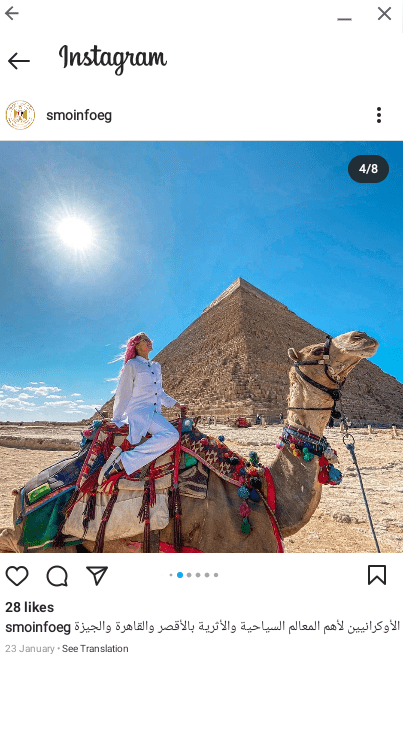Egypt has become one of the latest countries to dip their hand in influencer marketing, after recruiting 20 social media influencers to “support Egypt’s image in the media”. Known for its strict information and media control, and its history of human rights offences, Egypt’s image could do with all the help it could get.
Egypt is not the first country to attempt this new method of political communication; the lines between commercial and political marketing have become increasingly blurred as the political world realises the potential power of influencers. The UK government has paid several influencers over the last year to promote COVID-19 guidelines and testing, and Mike Bloomberg’s campaign for the US presidency paid several influencers and creators to promote his campaign. Some influencers have even become aware of the political power they hold, and use their platform to transition into politics, such as Youtuber Kim Kataguiri, the youngest person to be elected to Congress in Brazil.
But politics is such an antiquated institution, why is it suddenly so interested in influencers? The answer could be just that; influencers allow politicians to reach an untapped and often unengaged market – the youth. Traditionally apathetic to the political system, young people are often difficult to reach for politicians, especially when they have absolutely nothing in common with each other. Some influencers reach millions of young people online every day, something most politicians could only dream of. Most influencers are known for their peppy attitude and perfect appearance, and so it only makes sense that politicians hope to use them to create a positive and engaging campaign.
Influencers may be a new phenomenon, but using public figures to promote a country’s public image is hardly new; Australia has used Australian celebrities in its tourism adverts for decades. However, there is an unsettling difference between the Aussie adverts and Egypt’s new campaign, lurking in the latter’s dark history with social media.

Ten years ago, a first-of-its-kind protest movement emerged in the Middle East and North Africa. Known as the Arab Spring, it was only made possible by the emergence of social media sites and smartphones. For the first time, residents of countries like Egypt could communicate and spread messages to thousands of people instantly, allowing protest movements to organise and merge. Details of demonstrations were spread via email and Facebook, including a 12-page guide to peacefully removing ex-President Hosni Mubarak.
The right to peaceful demonstration and freedom of speech are protected in the Universal Declaration of Human Rights. However, when Mubarak’s regime caught wind of the storm happening online, they turned off Egypt’s internet services and 3G network. Despite their attempts to stop the revolution, it was too late, and Mubarak stepped down from office after 30 years of rule.
At the time, Mubarak’s defeat felt like a moment of real change for the people of Egypt and the Arab Spring, an end to the 30-year autocracy. Ten years on, however, Egypt is back to where it started, with a military-backed government that detains human rights activists, journalists, coup-supporters, LGBTQ+ members, and notably, anybody who puts posts online which do not fit in with their regime.
The recent arrests of five young TikTok influencers are clear examples of this. 22-year-old Mawada al-Adham, who has 3 million followers on TikTok, was charged with “violating Egyptian family values” for her video posts, alongside four other influencers. The videos, which were classic examples of TikTok trends such as dancing and lip-syncing, were claimed to be encouraging human trafficking. After several months of legal battles, the women were acquitted, but this is one of many examples of the deep mistrust between the people of Egypt and their government when it comes to social media.
It is therefore not surprising then, that the government is attempting to claw back their reputation with social media by using its influencers. Egypt also has a history of political propaganda, and there is nothing to suggest that this is not just history repeating itself. As mentioned earlier, influencers provide access to the previously inaccessible youth, who are very susceptible to the former’s subtle marketing. Young people get so much of their news and understanding of the world online, that low-key social media propaganda could really improve Egypt’s image in the eyes of the youth.
Social media influencers as a form of propaganda is a new field of study within political communication. However, we are in such early days of this new wave of communication that we cannot be sure how significant this moment really is. Over the last few years, we have seen social media bloom into a space for political and deliberative discussion, which has made a noticeable difference in young people’s interest in, and knowledge of, politics and social movements. Over the summer, we saw a clear example of social media politics’ power within the Black Lives Matter protests. Within academic and political circles, not only was this moment significant for its role in spreading the injustices that Black people face every day, it also demonstrated just how powerful a tool social media could be. What made this moment so special was that it was created and roused by the people; if this powerful tool lands in the wrong hands, the impact on social and cultural understanding could be immense.
We have yet to see just how the relationship between Egypt’s rulers and its influencers could play out. Potentially, it could not lead to much, and we might just see a couple of posts every few months of influencers in Egypt’s prettiest tourist spots. But, Egypt’s controlling history of social media and its information regime indicates that this won’t be as innocent as it seems.
Header image: Egyptian Influencer-turned Ambassador of New Media Farida Salem. Credit: Farida Salem.

